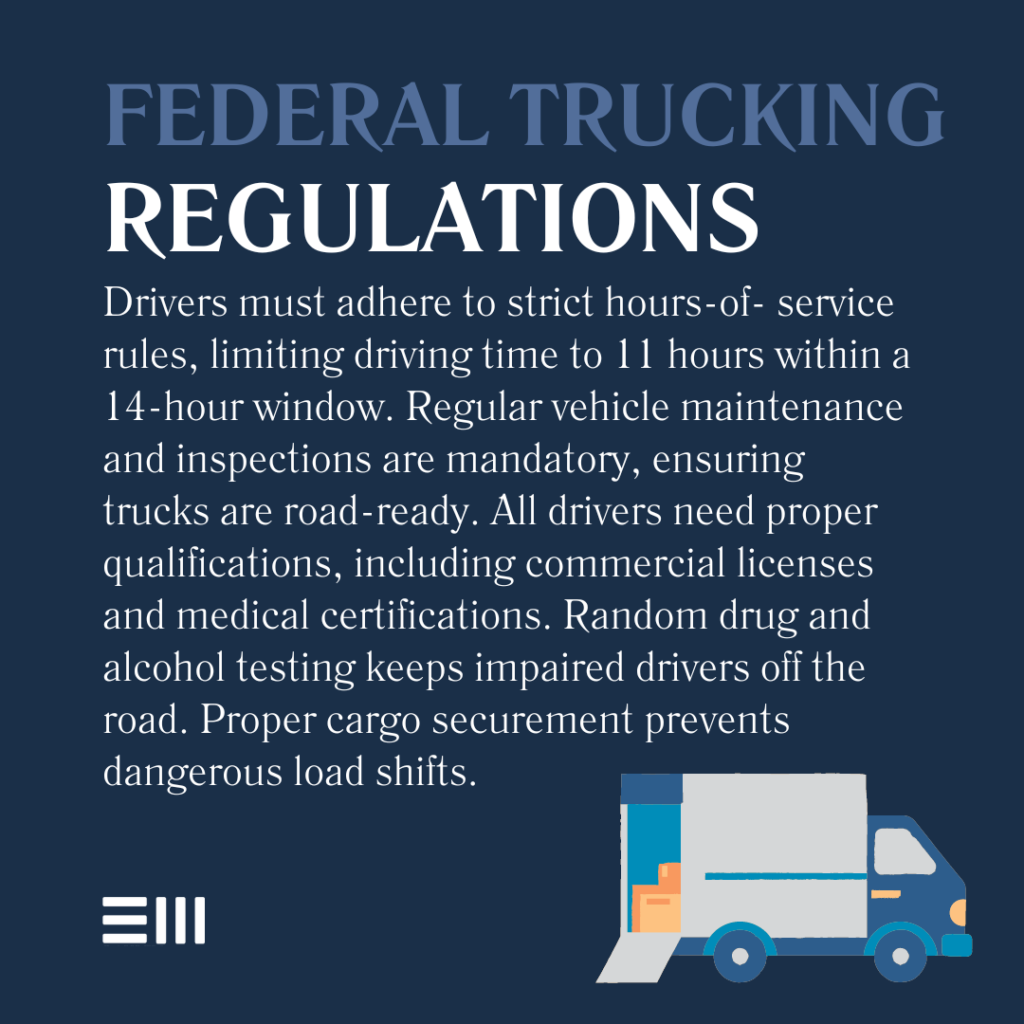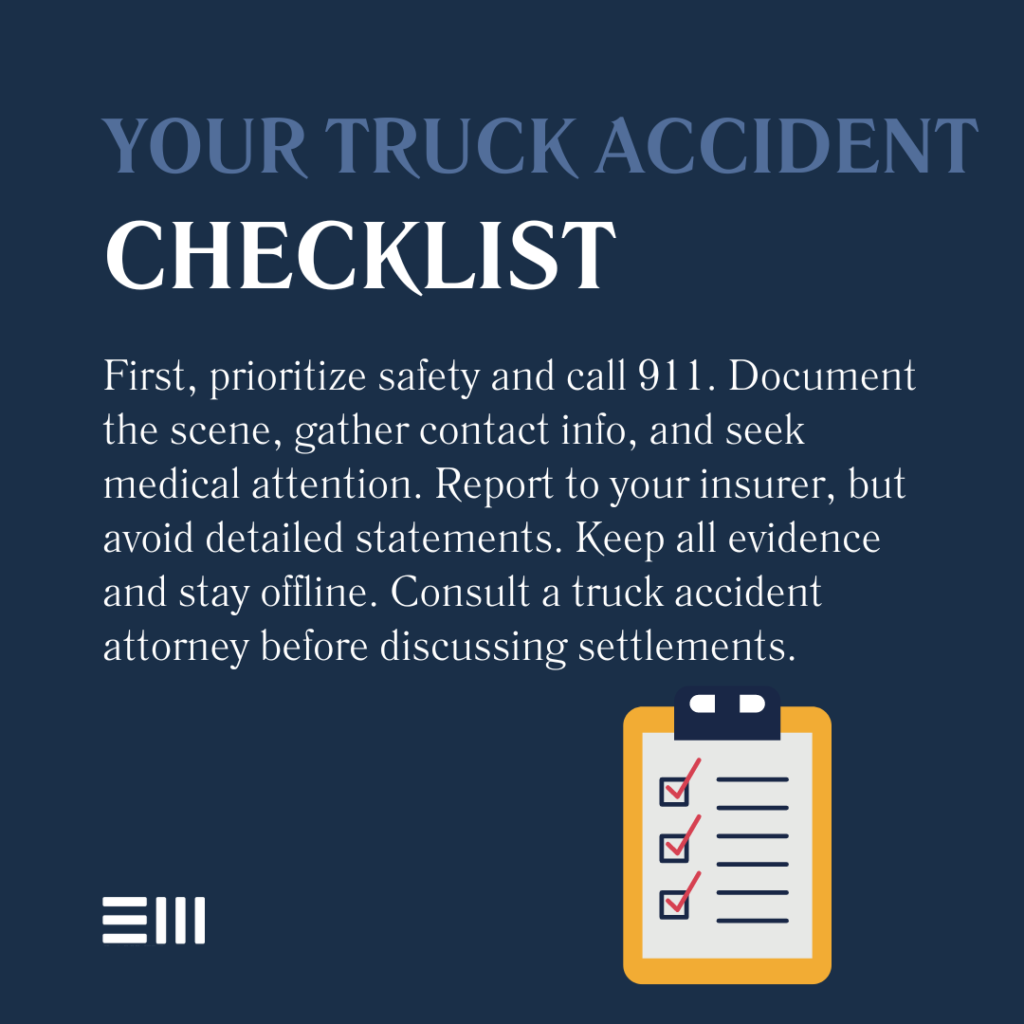
Imagine a fully loaded commercial truck weighing 80,000 pounds—the federal weight limit—barreling down I-65 at 65 mph.
Now consider this: it would take that truck nearly the length of two football fields to come to a complete stop. This stark reality underscores the potential for devastation when trucks are involved in accidents on Alabama’s highways.
In 2022, large trucks were involved in 10,622 crashes in Alabama, resulting in 148 fatalities and 2,629 injuries.
These numbers paint a sobering picture of the risks posed by commercial vehicles on our roads and the critical importance of understanding the complex web of regulations and liability issues surrounding truck accidents.
Understanding Truck Accidents in Alabama
The Alabama Department of Transportation reports that large trucks are involved in a disproportionate number of fatal crashes compared to their presence on the road.
Due to the size and weight of commercial vehicles, these accidents often result in more severe injuries and complex legal cases.
Key factors that make truck accidents in Alabama distinct include:
- The presence of major interstate highways like I-65, I-20, and I-85;
- The port of Mobile, which increases truck traffic in the southern part of the state; and
- Alabama’s contributory negligence law, which can significantly impact accident claims.
Understanding these factors is crucial when navigating a truck accident case in Alabama.
Federal Regulations Governing the Trucking Industry
The trucking industry is heavily regulated at the federal level to ensure safety on our nation’s highways.
The Federal Motor Carrier Safety Administration (FMCSA) is the primary agency responsible for overseeing and enforcing these regulations.
Key federal regulations include:
Hours of Service (HOS) Rules
- Limit driving time to 11 hours within a 14-hour on-duty period;
- Require a 30-minute break after 8 hours of continuous driving; and
- Mandate a 34-hour restart period after 60/70 hours on duty in 7/8 consecutive days.
Vehicle Maintenance and Inspection Requirements
- Require systematic inspection, repair, and maintenance of all vehicles;
- Mandate pre-trip inspections and documentation of defects; and
- Require annual comprehensive inspections.
Driver Qualification Standards
- Set minimum age requirements (21 for interstate, 18 for intrastate);
- Mandate commercial driver’s licenses (CDLs) for certain vehicle types; and
- Require medical examinations and certifications.
Drug and Alcohol Testing
- Enforce random, post-accident, and reasonable suspicion testing; and
- Maintain a clearinghouse of violations and test results.
Cargo Securement Rules
- Establish standards for properly securing different types of cargo; and
- Require regular inspections of cargo securement systems.
Understanding these regulations is crucial when determining liability in truck accident cases, as violations can often be indicators of negligence.

Trucking Company Liability
Trucking companies can be held liable for accidents involving their vehicles and drivers under various circumstances.
Understanding the concept of vicarious liability and the specific responsibilities of trucking companies is essential in these cases.
Vicarious Liability
Under the legal doctrine of respondeat superior, trucking companies can be held responsible for the actions of their employees while they are acting within the scope of their employment.
This means that if a truck driver causes an accident while performing job duties, the trucking company may be liable for damages.
Direct Liability
Trucking companies can also be directly liable for accidents if they:
- Fail to properly maintain their vehicles;
- Hire unqualified or unsafe drivers;
- Encourage or allow violations of federal regulations; and
- Fail to provide adequate training to their drivers.
Trucking companies must prioritize safety to prevent accidents and meet their legal obligations.
Independent Contractor Issues
Some trucking companies attempt to avoid liability by classifying their drivers as independent contractors.
However, courts often look beyond this classification to determine the true nature of the relationship between the company and the driver.
Negligent Hiring and Retention
Trucking companies have a duty to:
- Conduct thorough background checks on drivers;
- Verify proper licensing and qualifications;
- Monitor driving records and performance; and
- Take appropriate action if safety issues arise.
Failure to meet these obligations can result in liability for the company.
Common Causes of Truck Accidents
Understanding the common causes of truck accidents is crucial for both prevention and determining liability.
Some frequent factors include:
- Driver Fatigue: Despite HOS regulations, fatigue remains a significant issue.
- Distracted Driving: Use of mobile devices or in-cab technology can lead to accidents.
- Speeding and Aggressive Driving: Often due to tight delivery schedules.
- Poor Vehicle Maintenance: Brake failures, tire blowouts, and other mechanical issues.
- Improper Loading: Overloading or unbalanced cargo can affect vehicle handling.
- Weather Conditions: Rain, fog, and ice pose particular challenges for large trucks.
- Inadequate Training: Inexperienced drivers may struggle with the complexities of operating large vehicles.
- Drug or Alcohol Use: Despite strict regulations, substance abuse remains a concern.
Identifying the cause of an accident is crucial in determining liability and building a strong case.
Steps to Take After a Truck Accident
If you’re involved in a truck accident in Alabama, taking the right steps immediately afterward can significantly impact your ability to seek compensation.
Here’s what you should do:
- Ensure Safety: Move to a safe area if possible and check for injuries.
- Call 911: Report the accident and request medical assistance if needed.
- Document the Scene: Take photos of vehicle damage, road conditions, and any visible injuries.
- Gather Information: Collect contact and insurance details from all parties involved.
- Identify Witnesses: Get contact information from any witnesses to the accident.
- Seek Medical Attention: Even if you feel fine, some injuries may not be immediately apparent.
- Report to Your Insurance Company: Inform your insurer about the accident, but avoid giving detailed statements.
- Preserve Evidence: Keep all accident-related documents, medical records, and receipts.
- Avoid Social Media: Refrain from posting about the accident online.
- Contact an Attorney: Consult with a lawyer experienced in truck accident cases before speaking with insurance adjusters or accepting any settlements.
Taking these steps can help protect your rights and strengthen your potential claim.

Determining Fault in Truck Accident Cases
Establishing fault in truck accident cases often involves a complex investigation.
Multiple parties may share responsibility, including:
- The truck driver;
- The trucking company;
- Vehicle or parts manufacturers;
- Cargo loading companies; and
- Government entities responsible for road maintenance.
Factors considered in determining fault include:
- Driver logs and electronic logging devices (ELDs);
- Vehicle maintenance records;
- Black box data from the truck;
- Witness statements;
- Road and weather conditions; and
- Surveillance or dashcam footage.
It’s important to note that Alabama follows a contributory negligence rule, which means that if you’re found even slightly at fault for the accident, you may be barred from recovering compensation.
Compensation in Truck Accident Cases
Victims of truck accidents may be entitled to various forms of compensation, including:
- Medical Expenses: Current and future costs related to accident injuries
- Lost Wages: Compensation for time missed from work due to injuries
- Loss of Earning Capacity: If injuries affect long-term ability to work
- Pain and Suffering: For physical pain and emotional distress
- Property Damage: Costs to repair or replace damaged vehicles or property
- Loss of Consortium: Compensation for impact on marital relationships
- Punitive Damages: In cases of extreme negligence or intentional misconduct
The amount of compensation varies based on the specific circumstances of each case, including the severity of injuries and the degree of negligence involved.
Statute of Limitations for Truck Accident Claims in Alabama
In Alabama, the statute of limitations for personal injury claims, including those arising from truck accidents, is generally two years from the date of the accident.
This means you have two years to file a lawsuit against the responsible parties.
However, there are exceptions to this rule:
- If the victim is a minor, the statute may be tolled until they reach the age of majority.
- If the accident resulted in death, the statute of limitations for a wrongful death claim is two years from the date of death.
- Claims against government entities may have shorter notice requirements.
It’s crucial to consult with an attorney as soon as possible after an accident to ensure you don’t miss any critical deadlines.
Frequently Asked Questions
Navigating the aftermath of a truck accident can be overwhelming, and you likely have many questions.
Here are answers to some of the most common inquiries we receive about truck accidents, federal regulations, and trucking company liability in Alabama:
What Should I Do If a Trucking Company’s Insurance Adjuster Contacts Me?
It’s best to avoid giving detailed statements or accepting any settlements without first consulting an attorney. Insurance adjusters may try to minimize the company’s liability, potentially compromising your claim.
Can I Still Receive Compensation If I Was Partially at Fault for the Accident?
Alabama follows a strict contributory negligence rule, which means that if you’re found even 1% at fault, you may be barred from recovering compensation. This makes it crucial to have strong legal representation to protect your interests.
How Long Do Truck Accident Cases Typically Take to Resolve?
The duration can vary significantly depending on the complexity of the case, the severity of injuries, and whether the case goes to trial. Some cases may settle in a few months, while others can take years to resolve.
What If the Truck Driver Was an Independent Contractor?
Even if the driver is classified as an independent contractor, the trucking company may still be held liable under certain circumstances. An experienced attorney can help determine all potentially liable parties.
Are Punitive Damages Available in Truck Accident Cases?
Punitive damages may be available in cases where the defendant’s conduct was particularly egregious or reckless. However, they are not awarded in every case and are subject to specific legal standards.
How Can I Afford an Attorney for My Truck Accident Case?
Many attorneys who handle truck accident cases work on a contingency fee basis, meaning they only get paid if you win your case. This allows you to pursue your claim without upfront legal fees.
Get Expert Legal Support for Your Truck Accident Case
Don’t face the complexities of a truck accident case alone. At Baxley Maniscalco, we have the expertise and experience to guide you through every step of the legal process.
Our dedicated team of attorneys understands the intricacies of federal regulations and trucking company liability, and we’re committed to fighting for the compensation you deserve.
Contact Baxley Maniscalco today for a free consultation. Let us put our knowledge and resources to work for you, ensuring your rights are protected and your voice is heard.
Can't find what you're looking for? Search our site below.










